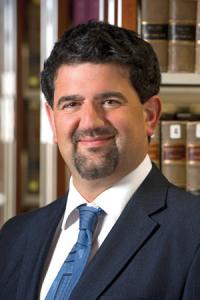The Law Scholar
Spring
2015
Spotlight on Hidden Physicists
The Law Scholar
Haider Ala Hamoudi, Associate Professor of Law, University of Pittsburgh School of Law
By:Haider Ala Hamoudi, Associate Professor of Law, University of Pittsburgh School of Law
 My undergraduate physics degree helped to launch my legal career in a very concrete way. It got me admitted to a school I am fairly sure I would never have had the opportunity to attend had I majored in almost anything else. My grade point average coming out of college was lower than any of my classmates at Columbia Law School. Yet they all had history and political science degrees. Because I was a physicist, I did not need to be quite as “perfect” as my classmates to get admitted.
My undergraduate physics degree helped to launch my legal career in a very concrete way. It got me admitted to a school I am fairly sure I would never have had the opportunity to attend had I majored in almost anything else. My grade point average coming out of college was lower than any of my classmates at Columbia Law School. Yet they all had history and political science degrees. Because I was a physicist, I did not need to be quite as “perfect” as my classmates to get admitted.
Once in law school, it became clear why. I was better prepared to meet the expectations imposed upon me by my professors. It seemed as if many of my classmates were unaccustomed to working long hours to prepare for class. They preferred to study as little as possible and, just before examination time, spend several sleepless nights in preparation for the big test. That does not work in law school, and nobody who has attempted a physics experiment or spent even a little time in a working lab would think it works in science either.
“Now I tell virtually anyone who enjoys science to get themselves a bachelor’s degree in physics.”
My degree in physics also provided various intangibles that tend to play in my favor. A junior partner at the firm where I began my career was interviewing me and noticed that I had a degree in the sciences. He asked me if I knew why spiders tended to inhabit his window but not the windows of his colleagues across the hall. Of course, that has little to do with physics, but the partner in question seemed to assume that science majors know everything scientific that there is to know. I hazarded a guess: namely, that his window was on the north side of the building and thus had less sunlight than those of his colleagues on the south side. He was so impressed, he told me years later, that he strongly recommended me for a position on the basis of that answer alone! I still don’t know if I was right, ironically enough.
A few years later, the same firm sent me to Indonesia to work on a very high-profile arbitration involving a major client because the dispute involved a power plant. My firm figured I could understand the generation of electricity from a steam turbine better than anyone else. I was able to take advantage of this opportunity in order to move on to the next phase of my career as a law professor, a job I have held happily for the last seven years. In many ways, I owe it all to physics.
Now I tell virtually anyone who enjoys science to get themselves a bachelor’s degree in physics. It prepared me incredibly well to work in a field in which no scientific knowledge is needed or assumed, and a large number of practitioners are, to put it charitably, mathematically challenged.
More from this Department
Spotlight on Hidden Physicists

